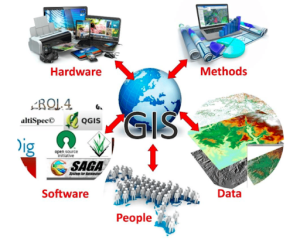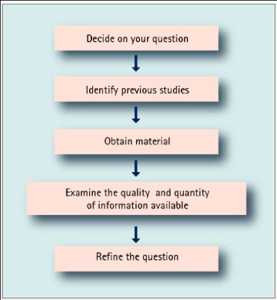Are you a student struggling to come up with research questions for a Geography dissertation writing? Does the idea of creating effective research questions leave you feeling tense? Don’t worry! This guide will make this process super easy for you.
Acumen Research and Consulting reported that by 2032, the global market for geographic information systems (GIS) is projected to grow from its USD 11.6 billion market size in 2022 to USD 41.3 billion. This indicates a 13.7% compound annual growth rate (CAGR) from 2023 – 2032.

Creating solid research questions can be tricky, especially for graduate and doctorate students. Think of these questions as the roadmap guiding your research project. They not only give your project a sense of purpose but also help you decide what to focus on and how to conduct your research.
But it’s not a walk in the park. In fact, many consider it one of the trickiest parts of research. In this article, we’ll solve your difficulties in formulating research questions for your geography dissertation. We’ll dive into the definitions of geography and research questions and then explore tips for creating research questions.
What is Geography?
Geography is all about understanding places and how people interact with their surroundings. Geographers dig into not only the natural environment of the Earth but also how human communities are spread across it. It mainly focuses on the Earth’s natural and man-made aspects. Furthermore, it explores the interactions between individuals and their surroundings and covers various subjects.
Geographical scientists study landforms, temperatures, ecosystems, and population distribution worldwide. This area of study explores the political, social, and cultural facets of many locales in addition to looking at the physical landscapes.
According to the paper, Calibration of raster image using GIS class software, the following are the important components of GIS:

When you start your journey toward a geography dissertation, you have to do thorough research to understand a complete and accessible overview of our planet Earth. Most students find it difficult to develop research questions for dissertation writing. If you also face such issues, fret not; you can get dissertation writing services from professionals.
Now, let’s explore the stressful and complex process of the research question and its qualities in detail.
What is the Research Question?
A research question is like a GPS for your study, guiding you through uncharted territory in the world of knowledge. It’s not just any question — it’s a clear, focused, and well-defined inquiry aiming to fill a gap in what we already know.
Here are the key qualities a great research question should have:
- Focused: Stick to one main issue or problem that aligns with your research goal. If you need multiple questions, make sure they all connect back to your central aim.
- Specific: Avoid vagueness in your geography dissertation research questions. It should be crystal clear and capable of generating a testable hypothesis through data collection and analysis.
- Relevant: Base your question on existing literature findings. It should address a gap or problem in current knowledge in your field.
- Researchable: Make sure you can gather credible data to answer your question. If you can’t, it might be time to rethink and reformulate.
- Feasible: Your question should be answerable within practical constraints. Keeping it specific, engaging with geographical research from all angles.
- Complex: Not overly complicated, but enough to avoid a simple yes or no answer. It should prompt a detailed analysis, investigation, and literature review.
- Ethical: Frame your question with care. Follow your university’s guidelines and ethical standards to ensure your research doesn’t harm participants.
Your research question is your tool for navigating the vast sea of knowledge. Make it sharp, focused, and ethical, and you’re on the right track! Now, let’s shed light on the next section, our step-by-step guide for writing perfect questions.
How to Write Geography Dissertation Research Questions?
Whether you are going to write an undergraduate dissertation or a doctoral dissertation, you need to create engaging and purposeful research questions. You can write a successful human geography dissertation in no time through this step-by-step guide.
In the paper Developing a Research Question, the author explained the following important steps that you must follow:

1.Identifying Your Research Area
Finding your research field is the first stage in creating research questions. Physical geography, human geography, and GIS are just a few of the many areas that fall under the broad umbrella of geography.
In order to reduce the number of possible research questions, precisely describe the scope of your study. To decide on the precise niche your dissertation will target, take into account your hobbies, areas of skill, and the gaps in the body of current work.
2. Reviewing Existing Literature
It is essential to review and analyse the current literature. Examine the literature for important themes, arguments, and gaps relevant to your selected research topic.
Moreover, observe current research, methods, and developing patterns to discuss in your geography dissertations. This review will show that you know the state of the topic today and will also help you formulate your research questions.
3. Creating Simple and Direct Research Questions
It is now time to develop your research questions since you have a firm grasp of your study field and the body of current literature. To guarantee precision and clarity, adhere to these guidelines:
Be Particular
Clearly state the main point of your research. Steer clear of queries that are too general or unfocused. Rather than asking, “How does climate change impact ecosystems?” think about, “What are the specific effects of rising temperatures on biodiversity in a tropical rainforest?”
Align with Objectives
Make sure the goals of your geography dissertation are in line with the research questions you are asking. Every inquiry ought to address the main research goals you have established for your investigation.
Consider Feasibility
Determine whether it is possible to address your research questions within the limits of your dissertation. Make sure you have access to the methods, data, and resources that you need.
Avoid Biased Language
Craft impartial and objective inquiries. This guarantees objectivity and is devoid of bias in your research.
4. Seeking Feedback
Consult your adviser, peers, or mentors for input after you’ve prepared your geography dissertation research questions. Giving constructive criticism is a great way to improve and refine your queries. Examine whether the questions make sense, are doable, and complement the main objectives of your dissertation.
5. Refining and Finalizing Your Research Questions
Finalise and hone your research questions in light of the comments you’ve received. Make sure every question is unique and adds to the study’s overall coherence. Furthermore, make sure that you strictly adhere to the standards of academic details.
However, if you need help from experts at any moment, you can get help with a geography dissertation online. If you have a shortage of time, you can also buy dissertation online.
Conclusion
Creating research questions for your geography dissertation is a demanding procedure that calls for a thorough comprehension of the subject. In conclusion, crafting effective research questions for your geography dissertation is a crucial step in your academic journey. With this guide, you now have a clear roadmap to create focused, specific, and relevant inquiries.
Remember, your research questions serve as the GPS for your study, guiding you through the complexities of geographical exploration. Seek feedback, refine your questions, and consider professional assistance online if needed.



